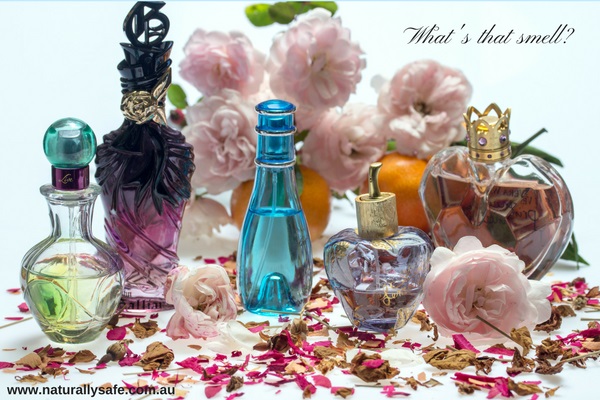The Hidden Dangers of Fragrance
Posted by Naturally Safe Cosmetics on 18th May 2017
Memo to all of my family and friends – please don’t give me perfume. Really, just stop. I can't wear it!
In the words of famous Aussie rock band Skyhooks, ‘ego is not a dirty word' but in the big wide world of cosmetics and beauty products, there is one word that just may be the dirtiest of them all – 'fragrance'.
“What’s wrong with fragrance?” I hear you ask as you dab a little more Chanel behind your ears. Well, where do I start?
Your average bottle of perfume contains an unidentified concoction of ingredients which often include chemicals known to cause a whole host of health issues. But you’ll never know what they are because manufacturers take advantage of a little loophole known as ‘trade secret’ so they don't have to tell you what's in that pretty bottle.

But it’s not just perfume that contains synthetic fragrance ingredients. These chemicals are found in many other items where the manufacturer is adding a fragrance to the product: skin care, body lotion, shampoo, deodorant, makeup, detergent, cleaning products, air freshener – the list goes on. In fact, there are approximately 3,000 chemicals which are known to be used as fragrance ingredients in everyday products.
So, why don’t I want perfume anymore? I used to wear perfume almost every day in my teens and early 20’s. Then one day, seemingly out of the blue, I developed a rash on my wrists – one of my preferred locations for spraying perfume. I stopped using perfume and the rash went away. I started using it again and the rash came back. I have not sprayed perfume on my skin since. In fact, these days I can barely stand to be next to someone wearing perfume. It gives me a headache or migraine and makes my skin feel itchy.
But it’s not just me. More and more people are finding that they have an intolerance to fragrance. They can't stand to be in a lift or a car with someone wearing perfume. They can't stand the automatic air fresheners in public toilets or even just standing behind someone wearing a potent fragrance in the supermarket checkout queue. Synthetic fragrance ingredients may be the reason and they have been linked scientifically to health problems like:
- Allergies
- Respiratory problems
- Headaches
- Dizziness
- Nausea
In addition, some are classified as neurotoxins and have been shown to cause endocrine (hormone) disruption and organ toxicity.
Lack of regulation in the personal care and beauty industry has allowed synthetic and toxic fragrance ingredients to be disguised behind the simple words ‘fragrance’ or ‘parfum’ on product labels. These terms hide nasty ingredients like phthalates, coumarin, formaldehyde, 1,4-dioxane and many, many more. We are talking about ingredients that lab tests have associated with cancer too. Ingredients that can accumulate in our bodies and have been detected in breast milk. Do your own research - it's pretty scary stuff!
So, what can you do? If you’re serious about reducing your exposure to known toxic chemicals, make the switch to products made with natural and organic ingredients. Certified organic products will give you even more peace of mind. If your products contain ‘fragrance’ or ‘parfum’, make sure it is naturally derived.
Want to know more? Check out the following interesting articles:
From the Canberra Times, an article about the serious health issues linked to fragrance chemicals:
And this detailed article on the dangers of synthetic scents from Dr Axe – a certified doctor of natural medicine, chiropractor and clinical nutritionist, with the second-most visited natural health website in the world:
https://draxe.com/dangers-synthetic-scents/
What do you think? Would you give up your favourite fragrance if you knew it contained harmful ingredients?
Tell us your experiences with fragrances.

